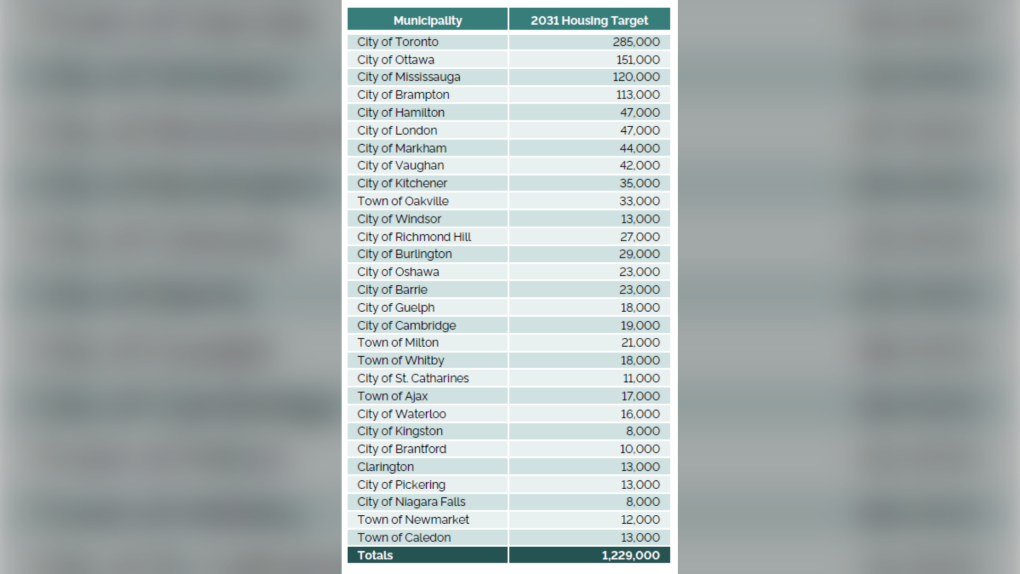What is actually in Ontario's new housing legislation?
The Ontario government announced numerous changes to housing-related legislation on Tuesday in an effort to meet its pledge of building 1.5 million homes in 10 years.
Here’s what would change if the bill were to pass:
Municipal zoning laws
- Up to three units will be allowed on a single residential lot without any bylaw amendments or municipal permissions. Municipalities will not be able to set minimum unit sizes or require more than one parking space per unit.
- Duplexes and triplexes will also be allowed on single residential lots
- Site plan reviews will be restricted to health and safety issues rather than landscaping or architectural details, meaning that exterior design will no longer be a matter subject to site plan control.
- Zoning changes to allow more near transit
Development charges
Development charges are fees collected from developers that help pay for the cost of municipal services or impacted infrastructure such as roads and transit.
- Development charges for additional units built on single residential lots will be waived
- Development charges will be waived for affordable housing, non-profit housing and inclusionary zoning units, as well as select attainable housing units. These homes would also be exempt from parkland dedication levies and community benefit charges
- Development charges will be reduced up to 25 per cent for family-sized rental units
- Any development charges in new bylaws as of June 2022 would be phased-in over five years to make the increases more manageable
Conservation authorities
- Conservation Authority fees for development permits and proposals will be temporarily frozen
- The regulations of 36 conservation authorities in Ontario will be streamlined into one
- When approving permits factors such as pollution and conservation of land will no longer be considered. Instead the only requirements would be the consideration of unstable soil or bedrocks. Permits will also be issued for development in areas “prone to flooding and erosion along rivers and lakes and within wetlands.”
Housing targets
The province identified 29 large municipalities housing targets based on population size and growth. The Greater Toronto Area, as well as Ottawa, will be responsible for more than half a million of the province’s 1.5 million goal.
 Housing targets for 29 Ontario municipalities as outlined by the provincial government.
Housing targets for 29 Ontario municipalities as outlined by the provincial government.
Each city will be required to develop a “pledge” outlining how they will meet the targets.
Municipal fees and funding
- No additional funding has been announced thus far to help with housing targets
- Proposal that would require municipalities to spend or allocate at least 60 per cent of their development charge and parkland reserve balances each year ot building infrastructure and parks
- Increase maximum penalties to $50,000 for “bad actors” who terminate contracts or cancel projects such as pre-construction homes
- Increase the non-resident speculation tax from 20 per cent to 25 per cent
Inclusionary zoning
- Make inclusionary zoning rules “more consistent” where they are applied, including a maximum 25-year affordability period, a five per cent cap on the number of affordable units and a standardized approach to determining an “affordable price or rent”
Community involvement in development
- Limit third-party appeals at the Ontario Land Tribunal for official plan amendments, zoning bylaw amendments, as well as “minor variances and consents.” This includes appeals made by individuals or community groups not directly involved in the development case
- Speeding up decisions at the Ontario Land tribunal by prioritizing cases that will create the most housing, among other things
- Municipalities will no longer be required to hold public meetings for drafts of a new development
- Reduce parkland requirements for higher density residential developments
CTVNews.ca Top Stories

Joly touts 'private' diplomacy as Mexico criticizes Canada's culture, trade
Foreign Affairs Minister Mélanie Joly is not escalating a war of words with Mexico, after the Mexican president criticized Canada's culture and its framing of border issues.
Singh won't support Conservative non-confidence motion that uses his own words
NDP Leader Jagmeet Singh says he won't play Conservative Leader Pierre Poilievre's games by voting to bring down the government on an upcoming non-confidence motion.
Calgary man who drove U-Haul over wife sentenced to 15 years
A Calgary man who killed his wife in 2020 when he drove over her in a loaded U-Haul has been sentenced to 15 years behind bars.
Canada Post strike: Kids no longer need to mail their letters to Santa by the end of the week
Canada Post says it has removed the deadline for its Santa Claus letter program amid an ongoing national workers' strike that has halted mail delivery leading up to the holiday season.
Opposition leaders talk unity following Trudeau meeting about Trump, minister calls 51st state comment 'teasing'
The prime minister’s emergency meeting with opposition leaders on Tuesday appears to have bolstered a more united front against U.S. president-elect Donald Trump’s tariff threats.
Another case of 'zombie deer' disease confirmed in B.C.'s Kootenays
Health officials have confirmed a fourth case of chronic wasting disease in B.C.’s Kootenay region, prompting calls for a swift cull to prevent further spread.
Man severely injured saving his wife from a polar bear attack in the Far North
A man was severely injured Tuesday morning when he leaped onto a polar bear to protect his wife from being mauled in the Far North community of Fort Severn.
Video shows 'completely unprovoked' stranger attack in Vancouver, police say
Police in Vancouver are searching for witnesses after a seemingly random and unprovoked assault was captured on video in the city's downtown core.
South Korea lifts president's martial law decree after lawmakers vote against it
South Korean President Yoon Suk Yeol's government early Wednesday lifted the martial law he imposed during a tense night of political drama in which troops surrounded parliament and lawmakers voted to reject military rule.

































